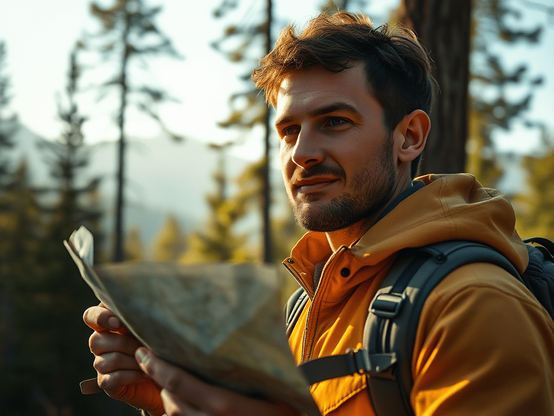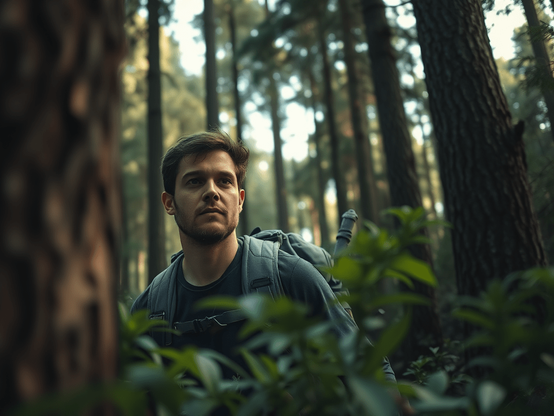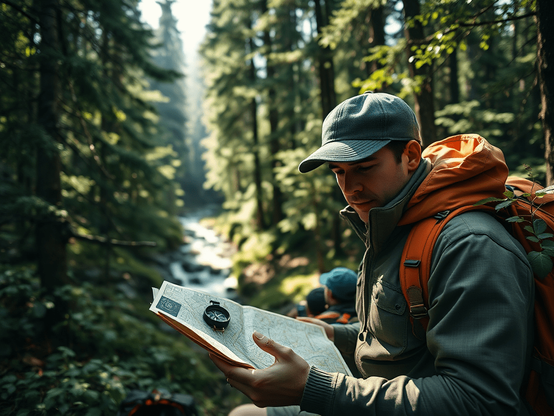7 Psychological Habits of #StayingCalm Under Pressure
1. Mindfulness Practice
2. Positive Self-Talk
3. Visualisation Techniques
4. Reframing
5. Focus on Solutions
6. Emotional Regulation
7. Preparation and Planning
#stayingCalm
What to Do When You Get Lost While Hiking
Getting lost while hiking can be scary but staying calm helps. It’s important to be ready for the unexpected. With the right mindset and skills, you can learn from the experience.
Key Takeaways
- Stay composed and assess your situation before making any hasty decisions
- Retrace your steps and look for familiar landmarks or trail markers
- Use navigation tools like maps, compasses, and cell phones to determine your location
- Prepare for an overnight stay by finding shelter, building a fire, and rationing your resources
- Make yourself visible to potential rescuers through bright clothing, signal mirrors, or smoke signals
Stay Calm and Assess Your Situation
When you’re lost while hiking, don’t panic. It’s natural to feel scared, but staying calm and assessing the situation is key. By taking a deep breath and looking around, you can make smart choices and find your way back.
Don’t Panic and Make Rash Decisions
It’s easy to get scared when lost, but don’t run around. Panicking will only confuse you more. Instead, avoid panic and carefully assess your situation. Look for landmarks, check your map, and try to follow your steps back to the trail.
Take Deep Breaths and Remain Composed
- Take a few deep, calming breaths to center yourself.
- Avoid making any hasty moves or decisions.
- Remain composed and focused on the task at hand.
By staying calm and assessing the situation, you’ll find your way back. Remember, panicking makes things worse. So, take a deep breath and trust yourself to get through this.
Retrace Your Steps
If you’re lost while hiking, start by retracing your steps calmly. This might help you find familiar landmarks or trail markers. They can guide you back to where you started.
Look for Familiar Landmarks or Trail Markers
As you retrace your steps, look for landmarks or markers you know. These could be unique rock formations, trees, or signposts from earlier in your hike.
Check for Cell Phone Signal and Call for Help
Also, check if you have a cell phone signal while retracing your steps. If you can call, reach out to emergency services or your hiking friends for help. Even a weak signal can help you send a distress signal or use GPS to find your location.
If you have an emergency whistle or a flashlight, use them to signal your presence. Three whistle blows or flashes can attract rescuers’ attention.
Key Tips for Retracing Your StepsRemain calm and focused Look for familiar landmarks or trail markers Check for a cell phone signal and call for help if possible Use emergency whistles or flashlights to signal your locationBy retracing your steps, identifying landmarks, and using your cell phone and other devices, you can find your way. Stay calm and trust these steps to help you out of the wilderness.
Prepare for an Overnight Stay
If you’re lost in the wilderness and need to spend the night, finding shelter and building a fire are key. These actions keep you warm, safe, and can lift your spirits.
Find Shelter and Build a Fire
First, look for a natural shelter like a cave, rock overhang, or thick tree thicket. It will shield you from the weather and offer a cozy spot for the night. Next, gather dry materials to start a fire. This will keep you warm and ward off predators.
Stay Hydrated and Ration Your Food
It’s vital to stay hydrated when stranded. Fill your water bottle from streams or lakes if you can. Also, ration your food to keep your energy up. Don’t eat too much, as you don’t know when help will arrive.
- Collect dry wood and kindling to build a fire
- Seek out a natural shelter like a cave or dense tree cover
- Fill your water bottle from nearby water sources
- Ration your food to make it last as long as possible
By preparing for the night ahead, you boost your chances of staying safe and comfortable. Stay calm and make smart choices – your survival depends on it.
Use Navigation Tools
Getting lost while hiking can be scary. But, using the right tools can help you find your way back. Maps, compasses, and following natural features like streams can guide you.
Consult Your Map and Compass
Check your map and compass if you have them. They can show you where you are and where to go. Even without a detailed map, following a stream or ridgeline can lead you back to safety.
Practice using your map and compass before you go. Don’t just rely on GPS, as it can fail in remote areas. Always carry your map and compass as a backup.
Follow Streams or Ridgelines
- Streams and rivers can guide you back to roads or trails.
- Ridgelines offer a view of landmarks or paths in the distance.
- Stay alert and watch for signs of the trail or landmarks.
Using maps, compasses, and natural features can help you find your way. Stay calm, think clearly, and make smart choices to get back to safety.
getting lost hiking
Getting lost while hiking can be scary and stressful. But, it’s key to stay calm and think clearly. There are steps we can take to find our way back safely.
First, we need to look around and see what we have. Take a deep breath and search for landmarks or trail markers. If we have a map and compass, now is the time to use them to figure out where we are.
- Try to go back to the last point we knew on the trail.
- Look for signs of the trail, like footprints or blazes on trees.
- If we have cell phone coverage, call for help or use GPS to find our location.
If we can’t find our way back, we might need to stay overnight. We need to find a shelter, gather firewood, and ration our food and water. Staying hydrated and warm is crucial to keep our strength and spirits up.
Survival EssentialsDescriptionShelterLook for natural structures, such as caves or dense foliage, that can provide protection from the elements.FireGather dry kindling and use a lighter or matches to start a fire for warmth and signaling purposes.WaterLocate a nearby water source, such as a stream or lake, and purify it before drinking to avoid illness.FoodRation any snacks or provisions you have to make them last until help arrives or you can find your way out.Staying calm and making smart choices are crucial when lost while hiking. By focusing and using what we have, we can boost our chances of being found or finding our way back to safety.
Make Yourself Visible for Rescuers
If you get lost while hiking and choose to wait for rescue, it’s key to be visible. Use different ways to signal and make yourself seen. This can help rescuers find you faster.
Use Bright Clothing or Signal Mirrors
Wearing bright clothes is a great way to get noticed. Choose neon colors or patterns that pop against the background. A signal mirror is also helpful. It reflects sunlight, creating a glare that can be seen from far away.
Build Smoke Signals or Whistle for Help
Building smoke signals is a good option if you have the right materials. Make a small fire and use damp stuff to create thick smoke. This smoke can be seen from far off. You can also use your emergency whistle to signal. Three blasts is the universal distress signal.
Using both visual and sound signals can help you get found quickly. By combining these signaling rescuers and visibility tactics, you boost your chances of a safe rescue.
Prevent Injury and Illness
When you’re lost in the wilderness, keeping safe is key. You might be waiting for help or trying to find your way back. Taking care of your body can really help.
Treat Wounds and Avoid Infection
First, clean and treat any wounds you have. Even small cuts can get infected if not taken care of. Make sure to disinfect and bandage them properly. Keep a basic first-aid kit with you for supplies.
Stay Warm and Dry to Prevent Hypothermia
Being outside can be dangerous. It’s important to stay warm and dry to avoid hypothermia. Build a fire with dry wood and keep warm by using leaves or clothes.
Watch for signs of frostbite or dehydration. Ration your food and water wisely. By taking care of your body, you can face the wilderness better and hope for a safe return.
Maintain a Positive Mindset
Being lost in the wilderness can be tough on your mind. It’s easy to feel scared and hopeless. But, staying positive and focused might just save you.
Keeping a positive mindset is key when things get tough. Instead of focusing on the bad, try to think positively. Do things that keep your mind busy, like looking for help or planning your next move. This can help you feel less alone.
Don’t let fear and anxiety get the best of you. Breathe deeply, stay calm, and trust yourself. Staying motivated and believing in yourself can really help.
- Engage in tasks to keep your mind occupied
- Avoid dwelling on negative thoughts
- Practice deep breathing to stay calm and focused
- Believe in your ability to overcome this challenge
Your mind is your strongest tool when lost. By being positive and motivated, you’ll face challenges better. This will increase your chances of a safe return.
Conclusion
Getting lost while hiking might seem scary, but we now know how to handle it. We can stay safe by staying calm, retracing our steps, and using navigation tools. It’s also key to be visible to rescuers and keep a positive attitude.
The main takeaways from this article are to always be ready, research the area, and pack the right gear. With the right mindset and preparation, we can turn a bad situation into a learning moment. Remember, nature can be unpredictable, but with the right knowledge, we can enjoy it safely.
As we go on our next outdoor adventure, let’s remember these lessons. We should embrace the thrill of exploring while being prepared for the unexpected. This way, we can enjoy the beauty of nature while staying safe and sound.
FAQ
What should I do if I realize I’m lost while hiking?
Stay calm and don’t panic. Take deep breaths and think clearly. Decide how to find your way back or call for help.
How can I avoid getting lost in the first place?
Tell someone your hiking plan and check the trail conditions. Bring a map, compass, and emergency supplies. Even with these steps, getting lost can still happen.
What should I do if I can’t find the trail or my location on the map?
Look for landmarks or trail markers to find your spot. If you have cell service, call for help. Use a whistle, flashlight, or other devices to signal for rescue.
How should I prepare if I have to spend the night in the wilderness?
Find a good shelter and start a fire for warmth. Stay hydrated and ration your food. Collect firewood and fill your water bottle for the night.
What navigation tools should I bring and how do I use them?
Carry a map and compass as backups, even with a GPS. Practice using them so you’re comfortable. If you don’t have a map, follow a stream or ridgeline downhill to find a road or trail.
How can I make myself more visible to potential rescuers?
Wear bright clothes, use a signal mirror, and make smoke signals. Blow your emergency whistle in bursts of three to signal your location.
How can I prevent injury and illness if I’m lost?
Clean and treat wounds to avoid infection. Stay warm and dry to prevent hypothermia. Collect dry wood for a fire and insulate yourself. Monitor for frostbite or dehydration and ration food and water.
What is the most important thing to focus on mentally if I get lost?
Keep a positive and focused mindset to survive and get rescued. Stay busy with tasks to fight loneliness and control fear. Staying calm and optimistic increases your chances of being found safely.
Source Links
- https://www.gore-tex.com/blog/what-to-do-if-you-get-lost-hiking – What to Do If You Get Lost Hiking
- https://americanhiking.org/resources/lost-outdoors/ – Lost Outdoors
- https://www.hillwalktours.com/walking-hiking-blog/what-to-do-if-you-get-lost-on-a-hike/ – What to do if you get lost on a hike? – Hillwalk Tours Self-Guided Hiking Tours
#buildingAFire #emergencyWhistle #findingShelter #gettingLostWhileHiking #mapAndCompass #navigationTools #preventingHypothermia #rationingResources #retracingSteps #signalingRescuers #smokeSignals #stayingCalm #stayingHydrated #trailMarkers
It's been a very stressful day. Now I have to fold laundry, and though that's an activity I often put off doing, it's also an opportunity to meditate. So today, I welcome the pile of laundry I need to fold.



